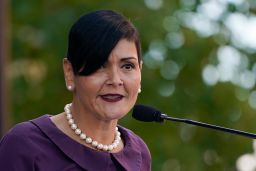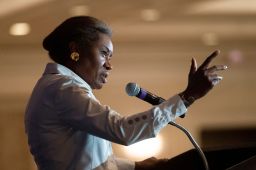Virginia is primed to elect a woman of color as its next lieutenant governor at a time when the commonwealth is facing a series of challenges that directly affect its Black and brown communities.
Regardless of whether it will be Democrat Hala Ayala or Republican Winsome Sears, they’ll draw from their personal experiences as the next administration tackles challenges such as the Covid-19 pandemic, crime, education and racial justice, even if they don’t agree on the political remedies.
She will also face the aftermath of a racial reckoning that has brought the commonwealth into a national spotlight. The killing of George Floyd last year ignited emotional debates about policing and the lingering presence of Confederate imagery. The pandemic has hit Black and brown communities especially hard, and a contentious debate over the teaching of race in the state’s public schools has emerged as a major issue in the gubernatorial campaign’s final weeks.
Politically, Virginia has gone from a slave trading mecca that once held the capital of the Confederacy to a state that has trended blue in recent elections. Two women of color are now running for its second-highest office, nearly two years after the state’s General Assembly elected its first female speaker of the House in its 400-year legislative history.
All of this makes Ayala and Sears’ candidacies “critical” for this moment in the commonwealth’s history, Kimberly Peeler-Allen, a co-founder of Higher Heights, a national organization that seeks to help Black women get elected to political office, told CNN.
“It shows that people of color, women of color are not a monolith by any stretch, but it also speaks to the evolution of Virginia,” said Peeler-Allen, who is also a visiting practitioner with the Center for American Women and Politics. “There’s a lot of promise in advancing women of color in leadership in the commonwealth and the country by looking at this race.”
Sensitive debates in campaign’s close
The campaign’s closing weeks have seen a fiery debate over how race should be taught in Virginia’s public schools, particularly over the teaching of “critical race theory,” a concept that examines the extent to which longstanding systems in America have led to unequal outcomes for people of color. Although the state’s Department of Education denies that CRT is taught in public schools, the debate has emerged as a key issue in the campaign’s closing weeks, the latest flashpoint in Republican-promoted culture wars.
Democratic gubernatorial hopeful Terry McAuliffe has denied that CRT is taught in the state’s public schools and has accused his Republican challenger, Glenn Youngkin, of inventing a campaign issue. Ayala has dismissed the controversy as a Republican talking point but also sees the teaching of systemic racism as a matter of honestly educating children about American history.
“We need to make sure that our students learn about history,” Ayala, who is Afro-Latina and whose mother was Lebanese and Irish, said in an August interview with the Virginia Mercury news outlet. “We understand the history of Byrd laws and Jim Crow, and the impact they’ve had on Black and brown Virginians. We need to focus on telling the accurate history of this commonwealth and this country.”
Sears, who was born in Jamaica and is a former vice president of the Virginia Board of Education, has called the concept “racist” but also said the good and bad of American history should be taught.

“If Critical Race Theory means that telling a child that once you emerge from the womb you are a racist and a colonizer and whatever else, that’s not going to be good. That’s going to create morale problems for everybody,” Sears told the Mercury in August. “If we’re going to teach about African American history, why just keep it to one month? Let’s teach it throughout. Let’s talk about these things. You can’t escape history. Let’s talk about the good, the bad and the ugly.”
Amid the clash of opposing views over teaching America’s dark past, the legacy of last year’s protests over racial justice has also renewed national debates about policing, crime and gun violence, particularly in Virginia, which is still reeling from the 2019 Virginia Beach shooting that left 12 dead.
The pain of losing a loved one to gun violence is all too familiar for Ayala, whose father was shot and killed when she was 2 years old. She has supported several gun control bills, including ones that would expand background checks and “red flag” laws, which allow people to ask a court to temporarily remove guns from those believed to be a danger to themselves or others. Ayala said she would work to ban assault-style weapons, untraceable firearms and “ghost guns.”
“Weapons of warfare have no place in our schools, our grocery stores or movie theaters,” she told CNN. “Our legislators need to step up and pass gun safety reforms to keep weapons of war out of our schools and communities, and to keep firearms out of the hands of domestic abusers.”
Asked if she supports greater support for law enforcement in stemming gun violence, Ayala responded that legislators should take action to pass gun safety reforms, adding that she does not support calls to “defund the police.” She has also called for efforts to increase transparency and training for police officers.
Sears, a Marine veteran, has vowed to protect gun rights and opposes a red flag law. She attracted controversy earlier this year when she posed with a rifle and maintains that gun ownership has “saved lives from criminal elements.” She also spoke of the need for “our police, Sheriff, corrections officers to keep our families and our neighborhoods safe.”
The two have also split on vaccine and mask mandates. Sears has refused to say whether or not she is vaccinated, opposes vaccine mandates and called for an end to the state’s mask mandate earlier this year. She’s encouraged people to get vaccinated but said “no one should be forced to disclose their vaccination status.”
Ayala, however, backs vaccine and mask mandates in certain settings and has been open about her vaccination status, posting pictures on social media when she received her first and second doses earlier this year. She told CNN she hopes her transparency will encourage others to get vaccinated and “we can only build trust by following the science.”
‘We have to have these difficult conversations’

Four years after the violent and deadly White nationalist rally in Charlottesville over the city’s decision to remove a Confederate statue, Virginia is also garnering national attention after a civil trial began Monday to decide if organizers had predetermined the event would turn violent. It is also taking place over a month after Richmond removed a statue of Gen. Robert E. Lee on iconic Monument Avenue that has long been at the center of tense debate.
For Ayala, it was long overdue for the Confederate statue to come down. As a member of the House of Delegates, she supported a bill last year that allowed local municipalities to take down Confederate monuments.
“We have to have these difficult conversations about race in America and the inequity,” Ayala told CNN. “It’s incumbent upon us that our leaders not only reflect leadership in the commonwealth, but also that they lead by example. This is about progress, and progress, it’s painful.”

Sears would not say whether she supports the removal of Confederate monuments when asked by CNN, though she has previously criticized Republicans who embraced the Confederate flag. Instead, Sears emphasized the progress made by Black people in her lifetime when asked about race relations in the commonwealth.
“We have a saying in church, ‘I may not be what I’m supposed to be, but I ain’t what I used to be.’ And that’s America,” Sears, a former member of the House of Delegates, said in an email. “We are not back in 1963, when my father arrived at the height of the Civil Rights Movement and things were very bad for us as Black people.”
“Are there changes that need to be made? Most assuredly,” Sears added. “There is no country in this world that does not suffer from racism. … But you have seen people who are dying to cross the border into America because they know that if they can get their foot on American soil, the trajectory of their lives will change – as it did for my father.”
Neither woman a stranger to being a ‘first’
Ayala in 2017 was one of the first Latinas elected to the Virginia House of Delegates, and in 2001, Sears became the first Black Republican woman to be elected to the chamber. Both have faced challenges as the first women of color in their respective positions.
“When I first got to Richmond, my class brought a wave of diversity and a record number of women – but we were still in a primarily male-dominated environment. I was propositioned by another politician on my first day,” said Ayala, who did not disclose the name of the individual.
Sears would not elaborate on the challenges she has faced as a Black woman in politics but noted, “I’ve faced challenges all my life.”
“Challenges help to bolster us even if the time of testing threatens to overwhelm us – becoming lieutenant governor will not be any different,” she said. “The glass ceiling has been shattered on many fronts but we still have a long way to go.”
Being a “first” in an elected office, particularly as a woman of color, carries the heavy juggling of trying to meet the expectation of others with a small margin of error while creating a path for others to follow, Peeler-Allen said.
“There is that pressure of being that ‘first’ and having the pressures of all of your identity being at that table and you’re being representative of all of that while also trying to move forward an agenda and having to navigate spaces that have historically not been made for you,” Peeler-Allen said.



